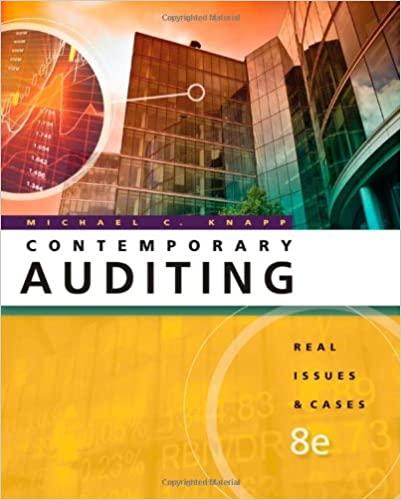After earning a law degree from the University of Capetown in 1988, 24-year-old Brett Kebble accepted an
Question:
After earning a law degree from the University of Capetown in 1988, 24-year-old Brett Kebble accepted an entry-level position with a prestigious Capetown law firm. The gregarious and impetuous Kebble soon realized that it would take years, if not decades, to achieve his personal goal of “making a name for himself” if he remained in the staid legal profession. So, Kebble decided to quit practicing law and join his father in the mining industry that has dominated the Republic of South Africa’s economy throughout that nation’s existence. Kebble’s father, a successful mining engineer, had raised his family in the mining town of Springs in northwestern South Africa, 40 miles south of Pretoria, the nation’s capital.
In 1991, Kebble and his father purchased a controlling interest in a small gold mining company. Three years later, Kebble, with the financial backing of his father and several other major investors, orchestrated the takeover of Randgold & Exploration Company Limited, one of South Africa’s leading mining companies. Over the following decade, Brett Kebble would become the chief executive of Randgold and two other mining companies, all three of which were publicly owned firms. By the turn of the century, Brett Kebble had accomplished his ultimate personal goal. Thanks to his role as the self-appointed spokesperson for South Africa’s allimportant mining industry, Kebble easily ranked among the nation’s highest-profile corporate executives. Besides his prominent position in the South African business community, Kebble had close associations with several of South Africa’s leading politicians and was a strong supporter of the arts. In 2002, Kebble, a large, heavyset man known for his quick wit and humor (and lack of modesty), established and funded the annual Brett Kebble Art Awards to recognize and reward leading South African artists, sculptors, and photographers.
Kebble’s reputation and business career were severely damaged in 2004 when Randgold & Exploration Company Limited, the crown jewel of his large business empire, reported a huge cash shortage. The missing funds were equivalent to several hundred million U.S. dollars. Stockholder revolts forced Kebble to resign in August 2005 as the chief executive of Randgold and the other two public companies for which he served in that position. One month later, in September 2005, the 41-year-old Kebble was gunned down in a wealthy section of Johannesburg while on his way to a dinner engagement in his silver Mercedes.
Johannesburg police immediately concluded that Kebble’s murder had been a well-planned “hit.” The widely publicized murder of the controversial businessman reinforced Johannesburg’s reputation as the murder capital of the world and served to bolster the prevailing view in the international business community that South Africa was a high-risk and dangerous place to do business. Even more damaging to the reputation of South Africa’s business community were subsequent revelations of the underhanded and illegal methods that Kebble had used to build his massive empire. One journalist characterized the late Kebble as a “cheat, manipulator, corrupter, briber, and swindler.”1 South Africa’s largest newspaper would add to that sentiment: “Brett Kebble was not a good South African. He was the great corrupter, a dirty businessman who had little respect for the law or codes of good business practice.”2 South African law enforcement authorities were investigating Kebble and his business and political allies well before he was murdered in September 2005. Those investigations continued on a larger scale following his death. Among the parties targeted by the investigations was PricewaterhouseCoopers (PwC), the audit firm of Randgold & Exploration Company Limited. Throughout Kebble’s tenure as Randgold’s chief executive, PwC had issued clean opinions on the company’s annual financial statements even as a huge amount of the company’s funds were being siphoned off by Kebble and several of his top subordinates. Randgold’s board of directors dismissed PwC and retained KPMG as the company’s independent audit firm shortly after the public was apprised of the missing funds.
After Brett Kebble’s death, Randgold’s new management team hired a consulting firm to carry out a forensic investigation of the company’s accounting records and financial affairs over the previous decade. Two dozen forensic auditors from the consulting firm spent months unraveling a series of complex and multilayered “Enron-style transactions” that Kebble and his subordinates had used to divert Randgold assets into related entities that they controlled.3 In a lengthy report issued in November 2005, the consulting firm recommended that Randgold’s new management team fi le civil and criminal charges against PwC. The consulting fi rm suggested that proper audits of Randgold would have led to the discovery and termination of the massive fraud engineered by Kebble.......
Questions
1. Research online and hardcopy databases to identify important recent developments within the South African accounting profession. Summarize these developments in a bullet format.
2. Over the history of the global accounting profession, political forces have often played a major role in the development of individual nations’ independent audit function. Explain how political forces have influenced the development and evolution of the independent audit function in the United States.
3. Identify the advantages and disadvantages of having a professional credential or designation for independent auditors in addition to a professional credential for accountants.
4. In your opinion, should the United States adopt a rule similar to South Africa’s “reportable irregularities” rule? Defend your answer. How do you believe such a requirement would affect the independent audit function and capital markets in the United States?
5. Identify strategies that the South African accounting profession could use to encourage young black men and women in that country to choose accounting as a career. In your opinion, what party or parties should take the lead in such recruiting efforts?
Step by Step Answer:

Contemporary Auditing Real Issues And Cases
ISBN: 9780538466790
8th Edition
Authors: Michael C. Knapp





